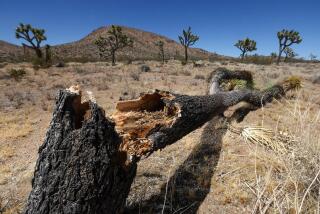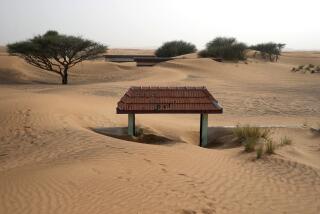Guarded by Mines, Bombs, Kuwait’s Desert Blooms
- Share via
KUWAIT CITY — The desert of Kuwait, battered by Persian Gulf War bombing, gushing oil wells and Iraqi mines, is blooming again, conservationist Charles Pilcher says.
Millions of mines and bombs are still strewn across the country, making much of it a no-go area. But they are powerful, if unlikely, ecological guardians.
Together with increased Kuwaiti military patrols, the unexploded ordnance is a daunting deterrent for would-be hunters, desert joy-riders and flocks of grazing sheep.
“(The desert) is blooming again. It’s wonderful. The vegetation is recovering at a tremendous rate,” said Pilcher, professor of pharmacology at Kuwait University and an active conservationist.
“This kind of unexploded ordnance has had a beneficial effect.”
At Jafra Pool Reserve, one of three nature areas set up in 1990 months before the Iraqi invasion, the bird population has risen sharply.
“There’s been a spinoff from having military patrols. . . . Duck and coot species I’ve plotted have risen in some instances 100-fold,” said Pilcher, who has been studying birds in the emirate since 1976.
Before the war, bored young men in search of thrills roamed the desert with shotguns, firing at anything that moved.
“In the old days we might have had 20 or 30 of one species of duck, and they’ve gone up to 2,000,” he said.
More to Read
Sign up for Essential California
The most important California stories and recommendations in your inbox every morning.
You may occasionally receive promotional content from the Los Angeles Times.













